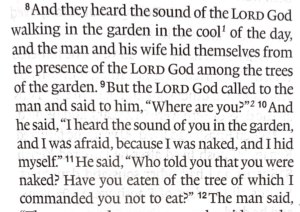After Adam and Eve sinned, THEY hid THEMSELVES from God. God did not hide from them. God pursued them.
So, does our sin separate us from God because He decided to separate us to punish us? Or do we separate ourselves because our of shame, knowing we are naked? Is the separation a punishment inflicted upon us from the hand of God, or is it just a byproduct of feeling shame before a perfect God, which we inflict upon ourselves?
Seeing that Adam and Eve hid themselves from God, it seems that mankind has separated himself from God, not God from mankind. In the story of the Prodigal Son, the son left the father, the father didn’t kick him out. The father didn’t cause the separation. And while the son was off sinning, the father never had a plan of punishment worked out.
If it is true that man has separated himself from God, then the cross could have a very different meaning than we’ve been told by mainstream Christianity.
Mainstream Christianity teaches:
- You’re a rotten sinner
- God the Father is angry at us for sinning
- God cannot really control His temper. His wrath must come out on someone, so you’d better believe Jesus will accept the wrath on your behalf, or you’ll end up receiving it. But one way or another, someone is going to be beaten.
- Jesus will plead our case before the Father
- Jesus will make the Father understand my sin problem and won’t torture me, but instead lets me into heaven.
- Father forgets by the time He gets to the next guy because Jesus has to explain it to Him all over again.
- God is an angry God with a fire pit from which no one can escape where He keeps people locked up forever as a consequence for them not believing He loves them.
- Since Jesus was tempted in all ways, He was like an undercover reporter who experienced our difficulties first-hand, and now He “gets it”. Now He can give the Father the inside scoop and Father can forgive us… unless we’re locked in his fire pit.
- The Father took out his anger and wrath on Jesus while He was whipped and beaten and died on the cross. Jesus was a scapegoat. He was like a proxy who received our beating from an angry father.
What if things are actually different than that? What if we separated ourselves from God?
Maybe the true meaning of the cross is this:
Mankind was stuck in a place where we believed we were separated from God and wouldn’t stop running from Him (just like in Genesis). The reason God warned us that sin would cause death was because our nature was to run from Him if we sinned because He is holy and we are not. So, when Jesus died on the cross, we saw God pursuing us all the way to the uttermost (Hebrews 7:25), to the point of death, which was our own self-inflicted “punishment”, which He endured, revealing to us that God was truly with us (Immanuel). The overcoming of death, the resurrection, was the proof that it was actually God.
If you do not believe, that means that you don’t know the truth and are bound by the old lie that you need to hide from God, and you are in effect not set free. Perhaps this is why believing is what saves you: because believing the lie is what condemned you.
Many Christians will dismiss this idea out-of-hand, accusing me of ignoring parts of scripture, but I think that a new perspective might cause you to evaluate the scripture differently. In other words, your starting point will dictate how you self-narrate the Bible as you read it.
If you think that God is angry, you’ll read “the curse” as retribution for Adam’s and Eve’s sin. Instead, if you think that God was protecting them, you’ll read “the curse” as a simple pronouncement of what Adam and Eve just did to themselves.
If you think God is angry, you’ll read “sacrifice” as proof that God is angry and needs blood. Instead, if you think that God is love, you’ll understand that the first sacrifice was in Genesis 3:20, and God did it for Adam and Eve so that they could cover their nakedness, for which they felt shame because they sinned.
So, you may have a natural rejection of the idea conveyed in this post, but think it through slowly. Take note of each objection you have and recognize your own assumptions. Are you imposing your assumption onto the Biblical text? I think we all do to some degree or another. Possibly more than we could have imagined.
